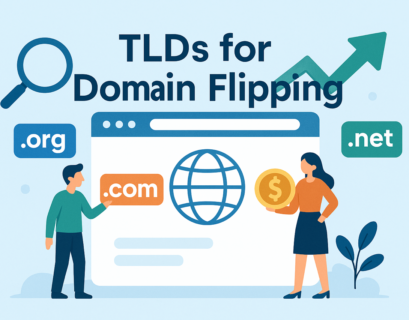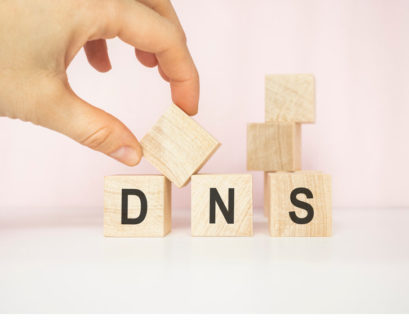In today’s globalized world, establishing trust and credibility is paramount for any company looking to succeed online. One effective way to build this trust is through the use of ccTLDs, country-specific Top-Level Domains. By adopting these domain extensions, businesses can target specific geographic markets and demonstrate their commitment to local customers. In this blog post, we will explore the meaning of ccTLDs and how they contribute to building trust and credibility. So, without any further ado, let’s start!
Table of Contents
What does ccTLD mean?
The short acronym ccTLD stands for country code Top-Level Domain, and it is a domain extension that represents a specific country or territory. These domain extensions are derived from the ISO 3166-1 alpha-2 country codes, which are internationally recognized codes for identifying countries and territories.
Each ccTLD is associated with a precise country or territory and indicates a website’s geographic location or target audience. For example, .us represents the United States, .de represents Germany, and .ca represents Canada.
Businesses commonly use such extensions to establish a local online presence or target specific regional markets. Using ccTLDs helps organizations to build trust, credibility, and relevance with the target audience by showing a commitment to serving customers in a specific country or region.
History of ccTLD
The origin of country code top-level domains (ccTLDs) dates back to the 1980s when the Internet Assigned Numbers Authority (IANA) was established to manage domain name systems. At the same time, the International Organization for Standardization (ISO) had developed a list of two-letter country codes as part of the ISO 3166 standard. Recognizing the potential, IANA decided to utilize these country codes to create country-specific domain extensions.
The first ccTLDs were established based on this framework, with countries such as Australia receiving “.au,” Germany receiving “.de,” and France receiving “.fr.” As the internet expanded globally, more countries and territories attempted to find their unique ccTLDs, and the decentralized model allowed individual nations to have authority over their own domain extensions.
Over time, the number of ccTLDs grew, reflecting international participation in the internet. Today, hundreds of ccTLDs represent countries, territories, and regions all over the world, serving as digital identifiers and symbols of national identity.
Numerous improvements in the global internet infrastructure led to the introduction of internationalized domain names (IDNs), which allow the use of non-Latin characters in ccTLDs. This made the internet more available for non-English speakers, enabling countries to use their native scripts in their domain extensions.
List of Popular ccTLDs
Here is a list of the most commonly used ccTLDs. They are the following:
Check all available TLDs from ClouDNS
Unique Stories
Every ccTLD has some kind of fascinating story behind it, reflecting the rich cultural diversity and national origin of the respective countries. Let’s explore a few interesting examples:
- .uk (United Kingdom): The .uk ccTLD originated from the Latin phrase “unitas katholica,” meaning “universal church.” However, it later evolved to represent the United Kingdom and its digital presence.
- .tv (Tuvalu): Tuvalu, a small Pacific island nation, entered into a partnership with a company called DotTV to market its ccTLD for use in the television and media industry. Today, .tv is a popular domain choice for multimedia websites.
- .io (British Indian Ocean Territory): Despite being a low-populated territory, the .io ccTLD has gained popularity among tech startups and online communities due to its similarity to Input/Output, a commonly used term in computing.
Experience Industry-Leading DNS Speed with ClouDNS!
Ready for ultra-fast DNS service? Click to register and see the difference!
The Importance of ccTLDs
Country code Top-Level Domains (ccTLDs) hold significant importance in the online world for several reasons, which include the following:
- Geographic Relevance: ccTLDs offer a strong sense of geographic relevance, instantly connecting businesses with a specific country or region. This can be highly advantageous for companies that primarily operate within a precise market, helping them build trust and credibility among local consumers.
- SEO Benefits: Search engines often prioritize localized content in search results. By utilizing ccTLDs, businesses can improve their chances of appearing higher in country-specific search engine rankings. This localization factor can significantly impact the organic traffic and visibility of companies targeting specific regions.
- Localized Marketing: Country-specific domain extensions provide an excellent opportunity for businesses to tailor their marketing efforts to precise target countries. By using a country TLD, companies can create region-specific campaigns, landing pages, and promotions, effectively engaging local audiences and driving conversions. As an example, if you run a referral marketing campaign in a localized market, using a localized TLD can build trust with locals and increase the click-through rate of your referral links.
- Brand Protection: Registering TLDs related to your business helps protect your brand from misuse and domain squatting. Securing relevant ccTLDs can prevent competitors or malicious entities from exploiting your brand’s identity and reputation.
Challenges
While ccTLDs offer numerous advantages, there are also challenges that website owners and businesses should consider:
- Limited Global Reach: Using a ccTLD might indicate that your website primarily targets a specific country or region. If you plan to expand internationally in the future, you may need to implement additional strategies like subdomains or gTLDs (generic Top-Level Domains).
- Legal and Compliance Considerations: Different countries have different legal and compliance frameworks for websites operating under ccTLDs. This includes data protection laws, consumer protection regulations, and intellectual property rights. Ensuring compliance with these requirements can be demanding, especially for businesses with a multi-country online presence.
- Domain Availability: Some ccTLDs have stricter registration requirements, leading to limited availability. As a result, securing a preferred ccTLD might be challenging for certain countries.
- Technical Limitations: Some ccTLDs may have technical limitations or restrictions compared to gTLDs. For instance, certain ccTLDs might not support specific website functionalities or have limited integration capabilities with certain platforms or tools. This can impact the overall user experience and functionality of your website.
Considerations when choosing a ccTLD
Here are several things you should keep in mind if you are preparing to use country TLDs:
- Local Regulations: Different countries may have specific requirements or restrictions when it comes to registering and using ccTLDs. It’s essential to familiarize yourself with the regulations of the target country to ensure compliance.
- Language Considerations: Some ccTLDs may use non-Latin characters, opening up possibilities for websites in languages other than English. This can be advantageous for businesses targeting non-English-speaking markets.
- Market Perception: Before selecting a country-specific TLD, consider how it might be perceived by your target audience. Some Top-Level Domains may have specific purposes or provide trust and authenticity among consumers within a particular market.
ccTLD vs. gTLD – Which One Should You Choose?
Choosing between a ccTLD (Country Code Top-Level Domain) and a gTLD (Generic Top-Level Domain) depends on your business goals, target audience, and SEO strategy.
A ccTLD (for instance, .uk, .de, .ca) is geographically specific and signals to search engines and users that your website is intended for a particular country or region. They improve local search rankings, enhance credibility among local customers, and build trust. However, ccTLDs can limit global reach since search engines associate them with a particular location, making it harder to rank internationally.
A gTLD (for example, .com, .org, .net) is more versatile and is not tied to a specific country. It is ideal for businesses targeting a global audience. They are easier to manage than multiple ccTLDs and avoid legal restrictions. By default, search engines do not associate gTLDs with any geographical location, allowing for broader reach. However, competing for rankings in local markets may be harder compared to a ccTLD.
So which one should you choose:
- If you’re a local business or targeting a specific country, a ccTLD is best.
- If you operate internationally or want a flexible domain, a gTLD is the better choice.
The right choice highly depends on your long-term business strategy and audience location.
Conclusion
Building trust and credibility is vital for brands that want to succeed in today’s competitive digital landscape. By adopting country-specific top-level domains (ccTLDs), businesses can establish a strong local presence, enhance user experience, and differentiate themselves from competitors. Country code TLDs not only improve search engine rankings but also demonstrate a commitment to serving local customers at the highest possible level. To maximize the influence of ccTLDs, companies should carefully consider domain availability and protect their brand. By using the power of ccTLDs, organizations can effectively build trust and credibility while nurturing valuable relationships with their target markets.






